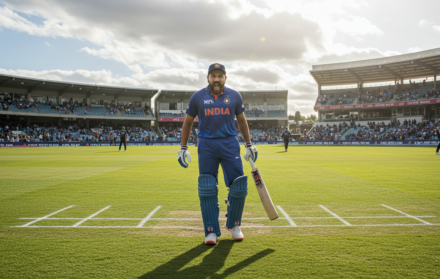
Balancing Academics and Cricket for Young Players
In the contemporary world where the juggle between academics and extracurricular activities defines the essence of a holistic development for young individuals, cricket emerges not just as a sport but as a discipline instilling profound life skills and values. The narrative of young players balancing academics and cricket is not merely about allocating hours in a day judiciously but encompasses a wider spectrum of physical, mental, and emotional growth facilitated by the sport alongside academic achievements. This article delves into the intricacies of managing both spheres effectively, underscoring the indispensable benefits, skills development, and the influence of cricket in shaping young minds and bodies.
Cricket, with its rich tapestry of techniques and strategic gameplay, offers a unique platform for children to explore their physical capabilities and foster teamwork, leadership, and discipline. The journey of introducing cricket to kids is a meticulous process that nurtures not only their sporting prowess but also embeds essential life lessons through the spirit of the game. As children evolve in their cricketing journey, the benefits of playing cricket extend beyond the field, contributing significantly to their physical health, coordination, and social skills, establishing a strong foundation for their personal and academic growth.
The developmental trajectory of young cricketers is marked by a comprehensive skillset that transcends the basic understanding of the game. Cricket skills and drills tailored for young players facilitate a progressive learning curve, adapting to their age and proficiency levels. This progression is crucial for maintaining a balanced growth in their cricketing abilities while ensuring that their academic pursuits are not sidelined. Further refinement of these skills is achieved through a structured progression for different age groups, which meticulously aligns with their physical and cognitive development stages, ensuring a harmonious balance with their academic workload.
Moreover, the mental aspects of cricket play a pivotal role in shaping a young player’s mindset, resilience, and approach towards both success and setbacks. Understanding the mental aspects of cricket equips young cricketers with the tools to navigate the pressures of the sport and academics, fostering a growth mindset that is invaluable in their educational endeavors. This mental fortitude is further reinforced through cricket’s ability to build confidence and self-esteem, which is paramount in facing academic challenges with determination and perseverance.
The choice of cricket equipment suitable for kids is another facet that underscores the importance of safety, comfort, and efficiency in nurturing young talents. Appropriate gear not only enhances their performance but also instills a sense of professionalism and respect towards the sport, mirroring the discipline required in their academic studies.
Inspirational stories of young cricketers serve as powerful testimonials of what can be achieved when passion for cricket is perfectly aligned with academic aspirations. These narratives not only motivate but also highlight the diverse pathways to success, encouraging young players to dream big both on and off the field. The burgeoning influence of women’s cricket further enriches this discourse, showcasing the sport’s inclusive nature and its role in empowering young girls to pursue excellence in cricket alongside their academic goals.
Parental involvement in kids’ cricket is indispensable, offering the necessary support system and encouragement to navigate the challenges of balancing sport and academics. This partnership between parents, coaches, and educational institutions is fundamental in creating an environment where young players can flourish in both domains, embodying the true essence of a well-rounded individual.
The confluence of academics and cricket in a young player’s life is a testament to the multifaceted benefits of engaging in sports while pursuing educational excellence. This article aims to explore the synergy between these two worlds, offering insights, strategies, and inspirational anecdotes to guide young cricketers and their support systems in achieving a harmonious balance.
Through a detailed examination of skill development, mental fortitude, equipment selection, and the inspiring journeys of young players, we underscore the transformative impact of cricket in shaping not just exceptional athletes but well-rounded individuals poised for success in all walks of life.
Time Management Is Key

Time management is key for young cricket players who are balancing their academic and sports commitments. Here are some steps to effectively manage your time:
1. Create a timetable that includes both your academic and cricket commitments. Allocate specific time slots for studying, attending classes, practicing cricket, and participating in matches.
2. Give priority to your tasks and tackle them first to avoid procrastination and ensure timely completion.
3. Avoid multitasking as it can decrease productivity. Focus on one task at a time and give it your complete attention.
4. Break down large tasks into smaller, more manageable goals. This will make them less overwhelming and easier to handle within the available time frame.
5. Minimize distractions by turning off phone or computer notifications. Create a peaceful study environment to enhance concentration.
6. Take regular breaks during study sessions or cricket training to prevent burnout and maintain a healthy balance.
7. If you struggle with time management, seek guidance from your coaches, teachers, or mentors for valuable advice and strategies.
8. Regularly assess your time management practices and make necessary adjustments to maximize productivity and achieve success.
Prioritize Academics and Cricket
Prioritizing academics and cricket is crucial for young players to excel both on the field and in the classroom. Here are some important factors to consider:
1. Time management: Proficient time management skills are required to balance academics and cricket. Young players should allocate specific time slots for studying, attending classes, and practicing cricket. By prioritizing and efficiently managing their time, they can succeed in both areas.
2. Academic performance: Neglecting studies is not advisable for young players. Achieving good grades and excelling academically is vital for their overall development. Maintaining a balance between sports and academics is important to ensure future opportunities in both fields.
3. Support system: Establishing a strong support system is crucial. Parents, coaches, and teachers should collaborate to ensure that young players receive the necessary support and guidance to excel in both academics and cricket. Regular communication and coordination are essential.
4. Setting goals: Young players should set clear goals for their academic and cricketing journey. By setting achievable goals, they can stay motivated and focused. Balancing academics and cricket becomes easier when one has a clear vision and purpose.
5. Stress management: Both academics and cricket can be demanding. Young players need effective stress management techniques. Engaging in activities like meditation, exercise, or hobbies can help reduce stress and enhance overall well-being.
Seeking guidance from mentors and experienced professionals can further enhance their development. By prioritizing academics and cricket, young players position themselves for success in all aspects of their lives.
Create a Study Schedule

Creating a study timetable is crucial for young cricket players who have to manage their academic studies and training. Here are the steps you can follow to create an efficient study schedule:
1. Establish priorities: Assess your academic goals and determine how much time you need to dedicate to cricket. Identify subjects or areas that require more attention.
2. Define specific study objectives: Divide your study goals into smaller, manageable tasks. For instance, aim to complete a specific number of chapters or homework assignments each day.
3. Allocate time slots: Set aside designated time periods for studying based on your cricket training schedule and commitments. Ensure you have uninterrupted blocks of time.
4. Utilize effective study techniques: Employ active learning strategies such as summarizing information, practicing with past papers, or explaining concepts to others. Experiment with different techniques to find what works best for you.
5. Take regular breaks: Plan short breaks between study sessions to recharge. This will prevent burnout and enhance your productivity.
6. Stay organized: Keep a planner or use digital tools to track your study schedule, deadlines, and upcoming exams. Prioritize tasks and allocate time accordingly.
7. Maintain commitment and discipline: Consistently adhere to your study schedule to stay on top of your academics and cricket training. Avoid procrastination and resist prioritizing one over the other.
8. Periodically evaluate and adjust: Regularly assess your progress and make necessary adjustments to your study schedule. Be flexible and adapt to changes in your academic workload or cricket commitments.
By following these steps and creating a study schedule that aligns with your needs, you can effectively balance your academic studies and cricket training without compromising either.
Communicate and Coordinate with Teachers and Coaches
Effective communication and coordination with teachers and coaches are vital for maintaining a balance between academics and cricket. Please consider the following essential points:
1. It is crucial to maintain open lines of communication with both teachers and coaches to ensure a harmonious balance between academics and cricket. Inform them in advance about your commitments and schedule to make necessary accommodations.
2. Have a conversation with your teachers about your cricket commitments and kindly request their understanding regarding potential conflicts with assignments, exams, or other responsibilities. Seek their guidance on managing academics alongside cricket.
3. Collaborate closely with coaches and teachers to create a well-structured schedule that can accommodate both academics and cricket. Prioritize important academic events and communicate them to your cricket coach in advance.
4. Utilize digital platforms, such as email or messaging apps, to facilitate effective communication with both parties. This ensures that everyone stays updated on any schedule changes or important information.
5. If you find it challenging to balance academics and cricket, don’t hesitate to seek assistance from your teachers and coaches. They can provide valuable guidance, resources, and much-needed support to help you maintain a healthy and successful balance.
6. Stay organized by utilizing a planner or digital calendar to keep track of assignments, practice sessions, and matches. This will greatly aid in managing your time effectively and avoiding any last-minute conflicts.
7. Take full responsibility for your academics and cricket commitments by being proactive and following through on your commitments. This will earn you the respect and cooperation of both teachers and coaches.
By effectively communicating and coordinating with teachers and coaches, you can achieve and sustain a harmonious balance between academics and cricket.
Take Breaks and Rest

When balancing academics and cricket, it is crucial for young players to take breaks and rest. Follow these steps for adequate rest:
1. Schedule regular breaks: Make sure to take scheduled breaks every hour of intense activity, allowing for 10-15 minutes of rest.
2. Engage in non-cricket activities: Encourage participation in activities like reading, listening to music, or taking a walk during breaks.
3. Practice mindfulness or meditation: Teach relaxation techniques such as deep breathing or guided meditation to help unwind and recharge during breaks.
4. Get enough sleep: It is important to establish a consistent sleep schedule and aim for 8-10 hours of sleep each night for physical and mental recovery.
5. Listen to their bodies: Pay attention to signs of fatigue or stress and take additional rest or modify training accordingly.
Pro-tip: Taking breaks and resting not only recharges young players physically and mentally, but also prevents injuries and promotes sustainability in academics and cricket.
Develop Effective Study Techniques
Developing effective study techniques is of utmost importance for young players who are striving to balance their academic and cricket commitments. Here are some strategies that can assist them in excelling in both areas:
1. Establish a schedule: Create a consistent study schedule to ensure dedicated time for academic work. Allocate specific blocks of time each day for studying and make sure to adhere to the schedule in order to avoid procrastination.
2. Organise study materials: Keep all study materials, such as textbooks, notebooks, and digital resources, organised and easily accessible. This will save time and prevent distractions during study sessions.
3. Take regular breaks: Encourage young players to take short breaks every 25-30 minutes instead of studying for long periods without breaks. This will help to keep their brains refreshed and enhance their focus and retention.
4. Use active learning techniques: Enhance understanding and retention by summarising information in their own words, teaching someone else, or creating flashcards.
5. Manage distractions: Minimise distractions by finding a quiet study environment, turning off notifications on electronic devices, and using website blockers or apps to restrict access to social media during study sessions.
6. Seek help when needed: Encourage young players to ask for help from teachers or classmates when they are facing challenges or have doubts. Establishing a support system can make studying more effective and efficient.
7. Regularly review and revise: Reinforce understanding and prevent forgetting by regularly reviewing and revising previously learned material. Incorporate regular revision sessions into the study routine.
By implementing these techniques, young players can develop effective study habits that will contribute to their academic success while still pursuing their cricket goals.
Stay Motivated and Goal-Oriented

Stay motivated and goal-oriented is crucial for young players balancing academics and cricket. Here are some tips to help them stay focused.
- Set clear goals: Define specific goals for academics and cricket, such as improving grades, winning a match, or mastering a skill.
- Create a schedule: Plan time effectively with a schedule for dedicated study and practice sessions. Stick to it to make progress in both areas.
- Stay organised: Use tools like calendars or planner apps to track assignments, deadlines, cricket matches, and practices. Prioritise tasks accordingly.
- Find motivation: Identify what drives you to work hard and stay committed, whether it’s excelling in academics and cricket or achieving goals.
Remember, staying motivated and goal-oriented requires consistent effort and discipline. Surround yourself with like-minded individuals who share your passion for academics and cricket. Their support and encouragement can push you to strive for excellence and maintain focus.
Seek Support from Mentors and Peers
Seeking support from mentors and peers is crucial for young players who are managing both academics and cricket. It is important to understand the reasons why this support is vital.
Firstly, mentors provide guidance based on their own experiences. They share strategies for effectively managing time, setting goals, and prioritizing commitments. This can greatly benefit young players who are juggling academics and cricket.
Secondly, peers offer emotional support and understanding as they face similar challenges. They provide companionship and motivation, helping each other stay accountable. This support is invaluable for young players who need encouragement and someone to relate to.
Mentors and peers provide feedback to identify areas for improvement. They offer tips and techniques to enhance cricket skills and academic performance. This feedback is essential for young players who want to excel in both areas.
Mentors can connect young players with coaches, scouts, or other professionals for additional guidance and opportunities. This networking can open doors for young players to further develop their skills and achieve their goals.
Both mentors and peers provide a valuable external perspective. They challenge assumptions and provide insights that young players may not have considered. This outside perspective can help young players grow both academically and in their cricketing abilities.
To effectively seek support, consider the following suggestions:
- Actively seek mentors who have experience in academics and cricket. Look for individuals who are knowledgeable and willing to provide guidance.
- Join cricket teams or clubs to connect with peers who are facing similar challenges. Engage in discussions to benefit from collective wisdom.
- Attend workshops or seminars that focus on the personal and professional development of young athletes. This is a great opportunity to meet mentors and peers.
- Utilize online forums or social media platforms to connect with like-minded individuals. Join cricketing communities to find support and build relationships.
- Be proactive in building and maintaining relationships with mentors and peers. Regularly seek their advice, feedback, and support.
By following these suggestions, young players can effectively seek support from mentors and peers who can help them succeed in both academics and cricket.
Understanding the Long-Term Benefits of Balancing Academics and Cricket

To understand the long-term benefits of balancing academics and cricket, it is important to consider the following key points:
1. Academic achievement: Balancing academics and cricket enables young players to prioritise their education while pursuing their passion for the sport. By focusing on their studies, they can excel academically and create opportunities for their future careers.
2. Discipline and time management: Balancing academics and cricket fosters discipline and teaches players how to effectively manage their time. They learn to allocate enough time for studying, training and participating in matches, thus enhancing their overall proficiency in handling their commitments.
3. Well-rounded development: Balancing academics and cricket helps in the development of a well-rounded personality. It promotes well-being by providing a balance between intellectual growth and physical fitness. This approach contributes to overall personal and professional development.
4. Transferable skills: Engaging in cricket alongside academics helps players develop valuable skills that can be transferred to other areas. These skills include teamwork, leadership, perseverance, and problem-solving. They are not only valuable in cricket but also in future endeavours such as higher education or entering the workforce.
How Can Young Players Balance Academics and Cricket?
Youth players often face difficulties in managing their time and priorities while juggling their academics and cricket. Here are some strategies that can assist them in maintaining a healthy balance:
1. Time management: To balance academics and cricket, it is important to create a timetable that allows for both activities. Utilize calendars or planners to effectively organize tasks and establish realistic deadlines.
2. Prioritize tasks: It is crucial to determine which tasks are urgent and important, and allocate sufficient time for both academic and cricket commitments. By prioritizing tasks, young players can effectively manage their time.
3. Communicate with teachers and coaches: To receive guidance and support in managing their workload, it is essential for young players to keep their teachers and coaches informed about their commitments. Effective communication can help in finding a balance between academics and cricket.
4. Implement efficient study techniques: Young players should implement effective study techniques such as breaking down tasks, using mnemonic devices, and practicing active reading strategies. These techniques can help them excel in both academics and cricket.
5. Practice discipline and self-motivation: Developing discipline and self-motivation is crucial for young players to stay dedicated to their goals and have a strong work ethic. By practicing discipline, they can remain focused on both academics and cricket.
Pro-tip: Balancing academics and cricket can be challenging, but by planning properly, managing time well, and persevering, young players can give equal attention to both areas.
What Are the Challenges Faced by Young Players in Balancing Academics and Cricket?

Balancing academics and cricket presents challenges for young players. Young players face the challenge of effective time management, which becomes crucial. Juggling schoolwork and cricket practice requires careful planning and organization. Finding enough time for both commitments without sacrificing the quality of either one is a formidable task.
Conflicting schedules between academic classes and cricket tournaments can arise, posing a challenge for young players. Keeping up with regular classes and staying on top of their studies while also attending training sessions and matches can be quite demanding.
There is an overwhelming pressure for young players to excel in both academics and cricket. They strive to meet the expectations placed upon them by their parents, teachers, and coaches. This pressure can ultimately lead to stress and anxiety.
The physical and mental exhaustion that comes from intense cricket activities can significantly impact a player’s academic performance. Fatigue and a lack of concentration hinder their ability to focus on their studies effectively.
Maintaining a social life becomes a challenging task for young players. They have limited time for socializing and participating in extracurricular activities outside of their commitment to both cricket and academics.
How Can Time Management Skills Be Developed?
To develop time management skills, young players can follow these steps:
- Set clear goals: Define what needs to be accomplished and create a timeline.
- Plan ahead: Use a planner or scheduling tool to allocate time for academics and cricket.
- Prioritise tasks: Determine important tasks and tackle them first.
- Break tasks into smaller steps: Divide larger tasks into manageable parts.
- Avoid procrastination: Start tasks promptly and maintain focus.
- Eliminate distractions: Minimise disruptions like social media and unnecessary phone use.
- Take regular breaks: Schedule short breaks to rest and recharge.
- Delegate responsibilities: If possible, delegate non-essential tasks.
- Learn to say no: Be selective with commitments to avoid overextending.
- Seek support: Communicate with parents, teachers, and coaches for planning and discussing academic and cricket commitments.
Are There Any Specific Study Techniques that Can Help Young Players in Managing Their Academics?

Young players can benefit from specific study techniques in managing their academics while pursuing a career in cricket. Are there any specific study techniques that can help young players in managing their academics? Here are some effective strategies to help them:
- Set goals: Prioritise studies alongside cricket commitments by setting clear academic goals. This will keep players motivated in both areas.
- Create a study schedule: To manage time effectively, allocate specific time slots for studying. This ensures enough time for academics without compromising cricket training.
- Use active learning techniques: Enhance information retention and understanding through techniques such as taking notes, summarising information, and engaging in group discussions. Cultivate these techniques for effective study sessions.
- Establish a conducive study environment: Concentrate better by creating a quiet, well-lit study environment that minimises distractions. Having a dedicated study space boosts productivity and efficiency.
- Seek support from teachers and mentors: Teachers and mentors provide valuable guidance, additional resources, and personalised assistance to support academic endeavours.
- Practice time management skills: Balance academics and cricket by developing effective time management skills. Prioritise tasks, set deadlines, and avoid procrastination to make the most of available time.
By incorporating these study techniques into their routine, young players can effectively manage academics while pursuing their passion for cricket.
How Can Parents and Coaches Support Young Players in Finding the Right Balance?
Parents and coaches have a significant role to play in helping young players find the right balance between their academic and cricket commitments. Here are some ways in which they can provide support:
1. Foster open communication: It is crucial for parents and coaches to maintain effective communication with each other to stay informed about the player’s schedule and commitments.
2. Establish a flexible schedule: Parents and coaches can work together to adjust practice timings and coordinate with teachers for study periods.
3. Prioritize time management: It is important for parents and coaches to emphasize the importance of efficient time management skills. They can guide the player in setting priorities, making to-do lists, and breaking tasks into manageable segments.
4. Provide academic assistance: Parents can help with homework and assignments by offering guidance and helping the player stay organized. Coaches can ensure that players have access to additional resources such as tutors or study groups.
5. Emphasize self-care: It is vital for parents and coaches to highlight the significance of physical and mental well-being. Encouraging sufficient sleep, a balanced diet, and engaging in relaxation activities can contribute to the player’s overall health.
By providing guidance, support, and resources, parents and coaches can help young players effectively balance their academic and cricket pursuits, enabling them to excel in both areas.
Fact: Research suggests that students who participate in sports while maintaining their academic performance develop discipline, time management skills, and perseverance, which all contribute to their future success.
What Are the Advantages of Balancing Academics and Cricket for Young Players?

Balancing academics and cricket offers numerous benefits for young players. By engaging in both, they can enhance their cognitive abilities, improve their time management skills, promote discipline and resilience, boost their physical fitness and overall well-being, and foster personal growth and character development.
The combination of academics and cricket requires mental agility, problem-solving skills, and strategic thinking, thus improving critical thinking and decision-making both on and off the field. Successfully managing academic responsibilities alongside cricket training and matches teaches young players valuable time management skills as they learn to prioritize tasks, allocate time for studying and training, and meet deadlines.
This juggling act also instills discipline and commitment, helping them persevere through challenges, manage time efficiently, and stay focused on their goals. Playing cricket involves physical activity, contributing to their overall health and well-being by boosting energy levels, improving cardiovascular health, and enhancing muscular strength.
Balancing academics and cricket provides opportunities for personal growth and character development, as young players learn about teamwork, leadership, sportsmanship, and self-discipline. By striking a balance between academics and cricket, young players can thrive academically and athletically.





